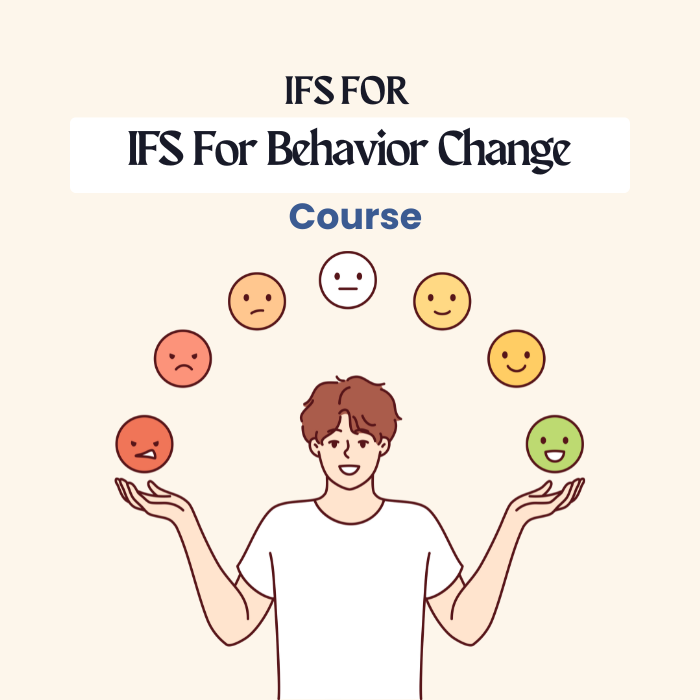IFS for Behavior Change: Breaking Bad Habits and Installing Healthy Ones 🌟🔄

A New Approach to Lasting Behavior Change 🛤️🌱
Ever find yourself stuck in a cycle of trying to change a habit, only to end up right back where you started? 🍩🍕 Whether it’s procrastination, overeating, or endlessly scrolling your phone, behavior change can feel like chasing your tail—if your tail happened to be holding a bag of chips. 😄
But what if your habits weren’t just random actions, but messages from Parts of you trying to help? Enter Internal Family Systems (IFS) therapy—a transformative method that helps you uncover the deeper reasons behind your habits and make lasting changes by working with—not against—your internal system.
In this article, we’ll explore:
- The IFS perspective on habits and behavior.
- How to work with Parts that resist change.
- Practical strategies to create sustainable habits using IFS principles.
Understanding Habits Through the Lens of IFS 🧠🌀
From the IFS perspective, habits are driven by inner Parts of your mind. These Parts often have positive intentions, even when their behaviors feel counterproductive.
Why Do We Form Habits?
Habits develop as coping mechanisms to protect us or bring comfort. For example:
- A Firefighter Part might turn to food or social media to distract you from overwhelming emotions. 🍔📱
- A Manager Part might push you to overwork, believing that productivity equals worth.
These Parts are like that friend who tries to help but keeps offering terrible advice. (“Eat a whole cake; you’ll feel better!”) 😂
The Role of Protectors in Habit Formation 🛡️
Protectors are Parts that step in to keep you safe from emotional pain. Habits often represent their coping strategies.
Common Protector-Driven Habits:
- Procrastination: A Protector trying to avoid failure or criticism.
Learn more about Procrastination Parts here - Overeating: A Firefighter soothing feelings of stress or rejection.
- Perfectionism: A Manager striving for control and approval.
While these habits may seem frustrating, they’re often rooted in attempts to shield Exiled Parts—vulnerable Parts carrying pain from past experiences.
How IFS Can Help You Break Bad Habits 🛠️🌟
IFS doesn’t see habits as enemies to fight but as signals to understand. By working with your Parts, you can transform their roles and create healthier behaviors.
1. Identifying the Habit-Driving Part 🔍
The first step is recognizing the Part responsible for the habit. Pay attention to:
- The emotions or urges behind the habit.
- The situations or triggers that activate it.
Example: Is a Part driving you to binge-watch TV after a tough day? It might be trying to help you escape feelings of overwhelm. 🎬
2. Building Compassionate Relationships with Parts 🤝
Rather than suppressing or judging the habit, approach the Part with curiosity:
- “What are you trying to protect me from?”
- “What do you hope to achieve with this habit?”
It’s like sitting down with your habit over coffee and saying, “Alright, what’s your deal?” ☕️
3. Unburdening Emotional Pain 🕊️
Habits often serve as shields for deeper emotional wounds carried by Exiled Parts. Through IFS, you can help these Parts release their burdens, allowing Protectors to step back and relax.
4. Installing New Habits with Self-Leadership 🌟
When the Self takes the lead, your system can adopt healthier behaviors. Self-led habits come from a place of calm, clarity, and compassion, making them easier to sustain.
Practical IFS Strategies for Behavior Change 🛠️💡
1. Pause and Tune In 🧘♀️
When you feel the urge to engage in a habit, pause and check in with yourself. Ask:
- “What am I feeling right now?”
- “Which Part is driving this urge?”
Think of this as calling a quick “team meeting” with your Parts. 🛑
2. Use the 6 F’s Process 🎯
Follow these steps to connect with the habit-driving Part:
- Find the Part linked to the habit.
- Focus on its thoughts and emotions.
- Flesh Out its role and motivations.
- Feel Toward it with compassion.
- Befriend it to build trust.
- Address its Fears about letting go of the habit.
Learn more about this process here
3. Visualize a New Role for the Habit-Driving Part 🎨
Imagine what the Part might do if it didn’t rely on the habit. For example:
- A Firefighter might learn to relax through meditation instead of overeating.
- A Perfectionist might become a supportive cheerleader rather than a harsh critic.
Visualizing this shift is like giving your habit a career makeover—“Congratulations, you’re now in mindfulness training!” 🎉
4. Create Small, Self-Led Rituals 🌙
Introduce rituals that align with your values and needs. For instance:
- Replace late-night scrolling with journaling or a gratitude practice. 📓
- Swap stress eating for a short walk or deep breathing. 🚶♀️
The Science Behind IFS and Behavior Change 🔬📊
IFS is backed by research showing its effectiveness in addressing emotional regulation and habit formation.
Key Findings:
- A study in the Journal of Psychotherapy Integration found that IFS helps reduce anxiety and stress, often drivers of bad habits.
- Neuroimaging research reveals that IFS calms the brain’s fight-or-flight response, creating space for intentional behavior.
By addressing the root causes of habits, IFS promotes sustainable, long-term change.
Explore the Transformative Power of IFS 🎓
If you’re ready to take charge of your habits, the IFS For Behavior Change course offers practical tools and guided exercises to help you:
- Identify and transform habit-driving Parts.
- Unburden emotional wounds tied to behaviors.
- Install new habits that align with your values and goals.
The IFS Guide App: Your Partner in Change 📲
The IFS Guide App offers tools to:
- Track and engage with habit-related Parts.
- Practice unblending techniques for clarity.
- Access guided meditations to support behavior change.
Final Thoughts: Break Free, Build Better 🌈💪
Your habits aren’t flaws—they’re strategies from Parts trying to protect you. With Internal Family Systems therapy, you can understand and transform these behaviors into healthier patterns that truly serve you.
So, ready to kick those bad habits to the curb and invite in healthier ones? Let’s ditch the guilt and embrace growth—one Part at a time! 🎉
Monthly IFS Workshops & Challenges!
Every month we organize online workshops to help you get a deeper understanding of IFS!
